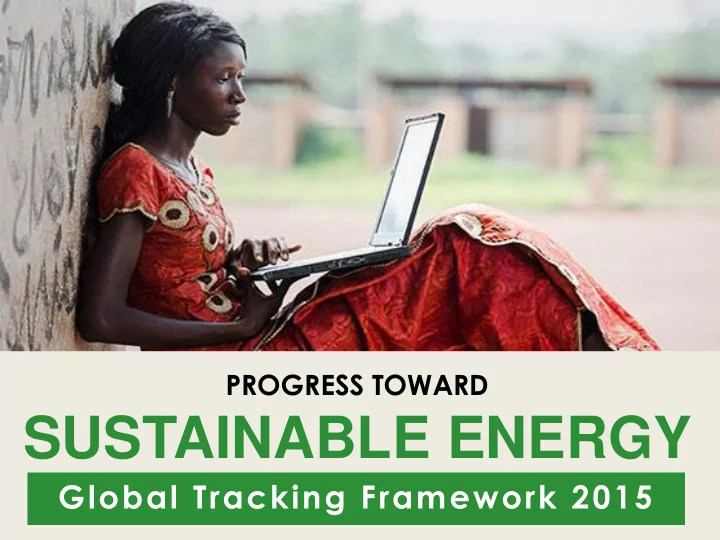

PROGRESS TOWARD SUSTAINABLE ENERGY Global Tracking Framework 2015
Despite acceleration, world still not moving fast enough to end energy poverty by 2030
Electrification: relatively strong progress 40% 60% 20% 80% 14% 0% 100%
Electrification: relatively strong progress 40% 60% 20% 80% 86% 14% 0% 100%
Cooking: still moving backwards 40% 60% 20% 80% 0% 100% -6%
Cooking: still moving backwards 40% 60% 20% 80% 0% 100% -6% -9%
Efficiency: encouraging progress 50% 40% 60% 20% 80% 0% 100%
Efficiency: encouraging progress 50% 40% 60% 65% 20% 80% 0% 100%
Modern renewables: encouraging progress 46% 40% 60% 20% 80% 0% 100%
Modern renewables: encouraging progress 46% 59% 40% 60% 20% 80% 0% 100%
Overview: A mixed report card 59% 40% 60% 65% 20% 80% 86% 0% 100% -9%
Asia: a mixed report card 50% 40% 60% 20% 80% 2% 0% 100% 112 120% % 129% 140%
Progress on energy access driven by electricity, Asia and urban areas
Electrification stays ahead of population growth, unlike cooking 111 million 62 million 80 million Average annual increase in population with Average annual access to population Average annual non-solid fuels increase 2010- increase in electrified 2010-2012 2012 population 2010-2012
Access deficit almost three times as large for non-solid fuels as for electricity 1.1 billion 2.9 billion Cooking access Electricity access deficit deficit
Electricity access forges ahead of population in Asia, but barely keeps pace in Africa 25.6 Average annual population increase in Africa 2010-2012 59.2 24.7 26.3 Average annual Average annual Average annual increase increase in electrified population in electrified population population in Asia 2010- increase in Asia in Africa 2010-2012 2012 2010-2012
Four times as many people gained access in urban than rural areas 20% Share of electrification progress in rural areas 80% Share of electrification progress in urban areas
Renewable energy progress driven by power sector and by developing world
Developing countries added three times as much renewable energy as developed countries 0.8 EJ 2.1 EJ Additional modern Additional modern renewable TFEC 2010-2012 in renewable TFEC 2010-2012 in developed countries developing countries
Power sector added far more modern renewable energy than transport or industry 1.7 EJ 0.5 EJ 0.2 EJ Additional modern Additional modern Additional modern renewable TFEC 2010- renewable TFEC 2010- renewable TFEC 2010- 2012 in electricity 2012 in industry 2012 in transport
Progress on energy savings driven by energy users in the developing world
Developing countries avoided twice as much energy consumption as developed countries 6.4 EJ 13.6 EJ Additional modern Additional modern renewable TFEC 2010-2012 in renewable TFEC 2010-2012 in developed countries developing countries
Transport and industry lead the way on avoiding energy consumption 19% Share of avoided energy consumption in other sectors 2010-2012 44% Share of avoided energy consumption in industry 2010- 37% 2012 Share of avoided energy consumption in transport 2010-2012
Thermal efficiency of fossil fuel based power generation stagnant at under 40% 48% 46% 37%
Global progress depends critically on performance of 20 “high impact” countries
Electrification Electrification rate did not increase between 2010-2012 Electrification rate increased by less than 2 percentage points 2010-2012 Electrification rate increased by at least 2 percentage points 2010-2012
Access to non-solid fuels Rate of access to non-solid fuels did not increase between 2010-2012 Rate of access to non-solid fuels increased by less than 2 percentage points 2010-2012 Rate of access to non-solid fuels increased by at least 2 percentage points 2010-2012
Energy efficiency Compound annual growth rate of energy intensity did not improve between 2010- 2012 Compound annual growth rate of energy intenstity improved by less than 2.6% per annum in 2010-2012 Compound annual growth rate of energy intenstity improved by at least 2.6% per annum in 2010-2012
Renewable energy Share of modern renewable energy in total final energy consumption did not improve between 2010-2012 Share of modern renewable energy in total final energy consumption improved by less than 1 percentage point 2010-2012 Share of modern renewable energy in total final energy consumption improved by at least 1 percentage point 2010-2012
Financing for Sustainable Energy Needs to Triple to Over US$1 Trillion Annual
Cost of reaching universal access modest compared to cost of meeting clean energy goals 9 US$m 49 US$m 546 US$m 258 US$m 130 US$m 560 US$m 397 US$m 1155 US$m Current annual Required annual investment (US$m) investment (US$m)
For more information on the report, please go to: trackingenergy4all.worldbank.org #endenergypoverty
Recommend
More recommend